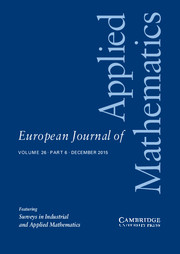Crossref Citations
This article has been cited by the following publications. This list is generated based on data provided by
Crossref.
Ball, John M.
and
Majumdar, Apala
2010.
Nematic Liquid Crystals: From Maier-Saupe to a Continuum Theory.
Molecular Crystals and Liquid Crystals,
Vol. 525,
Issue. 1,
p.
1.
Daly, K. R.
D'Alessandro, G.
and
Kaczmarek, M.
2010.
An Efficient $\mathcal{Q}$-Tensor-Based Algorithm for Liquid Crystal Alignment away from Defects.
SIAM Journal on Applied Mathematics,
Vol. 70,
Issue. 8,
p.
2844.
Paicu, Marius
and
Zarnescu, Arghir
2011.
Global Existence and Regularity for the Full Coupled Navier–Stokes andQ-Tensor System.
SIAM Journal on Mathematical Analysis,
Vol. 43,
Issue. 5,
p.
2009.
Ilg, Patrick
Hütter, Markus
and
Kröger, Martin
2011.
Ideal contribution to the macroscopic quasiequilibrium entropy of anisotropic fluids.
Physical Review E,
Vol. 83,
Issue. 6,
Majumdar, Apala
2011.
Order parameters in the Landau–de Gennes theory – the static and dynamic scenarios.
Liquid Crystals,
Vol. 38,
Issue. 2,
p.
169.
Henao, Duvan
and
Majumdar, Apala
2012.
Symmetry of Uniaxial Global Landau--de Gennes Minimizers in the Theory of Nematic Liquid Crystals.
SIAM Journal on Mathematical Analysis,
Vol. 44,
Issue. 5,
p.
3217.
Paicu, Marius
and
Zarnescu, Arghir
2012.
Energy Dissipation and Regularity for a Coupled Navier–Stokes and Q-Tensor System.
Archive for Rational Mechanics and Analysis,
Vol. 203,
Issue. 1,
p.
45.
MAJUMDAR, APALA
2012.
The radial-hedgehog solution in Landau–de Gennes' theory for nematic liquid crystals.
European Journal of Applied Mathematics,
Vol. 23,
Issue. 1,
p.
61.
Mucci, Domenico
and
Nicolodi, Lorenzo
2012.
On the Elastic Energy Density of Constrained Q-Tensor Models for Biaxial Nematics.
Archive for Rational Mechanics and Analysis,
Vol. 206,
Issue. 3,
p.
853.
Luckhurst, Geoffrey R.
Naemura, Shohei
Sluckin, Timothy J.
Thomas, Kenneth S.
and
Turzi, Stefano S.
2012.
Molecular-field-theory approach to the Landau theory of liquid crystals: Uniaxial and biaxial nematics.
Physical Review E,
Vol. 85,
Issue. 3,
Majumdar, Apala
2012.
The Landau-de Gennes theory of nematic liquid
crystals: Uniaxiality versus Biaxiality.
Communications on Pure & Applied Analysis,
Vol. 11,
Issue. 3,
p.
1303.
Luo, Chong
Majumdar, Apala
and
Erban, Radek
2012.
Multistability in planar liquid crystal wells.
Physical Review E,
Vol. 85,
Issue. 6,
Ilg, Patrick
2012.
Enhanced Landau–de Gennes potential for nematic liquid crystals from a systematic coarse-graining procedure.
Physical Review E,
Vol. 85,
Issue. 6,
Turzi, S. S.
and
Sluckin, T. J.
2013.
Symmetry Adapted Molecular-Field Theory for Thermotropic Biaxial Nematic Liquid Crystals and Its Expansion at Low Temperature.
SIAM Journal on Applied Mathematics,
Vol. 73,
Issue. 3,
p.
1139.
Majumdar, Apala
Ockendon, John
Howell, Peter
and
Surovyatkina, Elena
2013.
Transitions through critical temperatures in nematic liquid crystals.
Physical Review E,
Vol. 88,
Issue. 2,
Nguyen, Luc
and
Zarnescu, Arghir
2013.
Refined approximation for minimizers of a Landau-de Gennes energy functional.
Calculus of Variations and Partial Differential Equations,
Vol. 47,
Issue. 1-2,
p.
383.
Lamy, Xavier
2013.
Some properties of the nematic radial hedgehog in the Landau–de Gennes theory.
Journal of Mathematical Analysis and Applications,
Vol. 397,
Issue. 2,
p.
586.
Lin, Fanghua
and
Wang, Changyou
2014.
Recent developments of analysis for hydrodynamic flow of nematic liquid crystals.
Philosophical Transactions of the Royal Society A: Mathematical, Physical and Engineering Sciences,
Vol. 372,
Issue. 2029,
p.
20130361.
Raisch, A.
and
Majumdar, A.
2014.
Order reconstruction phenomena and temperature-driven dynamics in a 3D zenithally bistable device.
EPL (Europhysics Letters),
Vol. 107,
Issue. 1,
p.
16002.
Golovaty, Dmitry
and
Montero, José Alberto
2014.
On Minimizers of a Landau–de Gennes Energy Functional on Planar Domains.
Archive for Rational Mechanics and Analysis,
Vol. 213,
Issue. 2,
p.
447.

